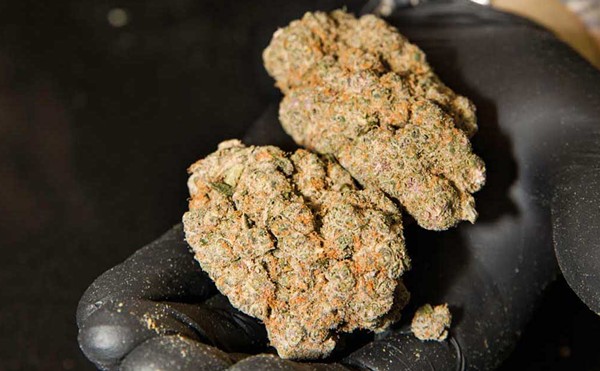The war against dirty marijuana has been declared. Untested caregiver-grown marijuana is dirty, dirty, dirty, according to something known as MICleanCannabis.org. And licensed, tested marijuana is clean, clean, clean. There couldn't be a more stark comparison.
The irony of the declaration is that it was made by a company that holds 12 licenses to grow marijuana and claims to be pre-qualified to hold 19 provisioning center licenses.
MICleanCannabis.org seems to be the name of an influence campaign organized by Green Peak Innovations LLC to pressure Gov. Gretchen Whitmer to stop allowing unlicensed caregivers to supply medical marijuana provisions in the legal system. Whitmer has stepped in to temporarily allow caregivers to continue supplying the system because not enough licensed product is available for the state's nearly 300,000 medical marijuana patients.
The campaign organized a rally at the state Capitol, and is advertising on billboards in the Lansing area, newspaper ads, and a website with a link to a petition calling for Michiganders to "Stand up for clean, safe marijuana." A full-page ad that ran in Sunday's Freep claims, "The will of the people has been contaminated" by "dirty" illegal weed.
That's pretty much the hill they're taking the fight to. It says much of the caregiver marijuana is "highly contaminated" and details a number of recalls and contaminants found during testing. It finishes with a suite of ideas: "Clean, safe marijuana. This is what we voted for;" and "stop the sale of untested, dirty marijuana," and finally, "Putting patient safety over profits."
These are all good sentiments, and they may have made a difference before patients were forced to depend on caregivers for the past decade. Now, many patients are comfortable with their products and have been getting good results. They have little motivation to switch to the regulated system, where — chances are — prices are higher. In addition, there simply aren't enough grow licenses out there yet to supply the demand for products. Even if Green Peaks was cranking out plants at their full capacity, it wouldn't satisfy the market.
Maybe they are. During a press tour at the Green Peaks Lansing-area facility, CEO Jeff Radway said he had 1,000 pounds of marijuana in storage because he can't get the price he wants from provisioning centers. Owners prefer to buy less-costly marijuana from caregivers, and patients happily sign waivers saying that they know it has not been tested. So far, nobody has claimed that it made them sick.
However, Green Peaks' claim of "Putting patient safety over profits" doesn't clearly come across as the motivation for this campaign when you consider that the corporation recently got a $30 million loan. People who give and receive that kind of money not particularly interested in losing it. In fact, the lender expects to make quite a tidy profit that is probably spelled out in detail in the loan contract. Those entities want profits, and those will come from patients.
The timing of this campaign seems timed to help HB 4440, which would cut caregiver supplies off on June 1 and shut down unlicensed provisioning centers. It passed the state house last week on a 102-4 vote. That type of a landslide looks like it will continue through the Senate. HB 4440 is one of a few signs pointing to big changes in the way marijuana is sold in Michigan come June.
The folks at Green Peaks are rallying to their cause, doing what they think needs to be done to protect their interests. It's a tough business at this point. There are enough rumors of local provisioning centers talking to larger entities that hope to get into Michigan. That's in large part because the state screwed up the licensing process from the start. Regulators seemed less about patients and more about law enforcement. The licensing rules are exclusive and expensive. Big changes are needed from that perspective.
Unfortunately, if the state now makes it easier and cheaper to get licenses, those who made it through the tough system as it stands will rightfully cry foul. While I don't worry about whoever handed Green Peaks $30 million, as bad as it is, if you've got $30 million to speculate with, you're going to be alright even if you suffer this kind of loss. But the people who cobbled together their money with some friends and relatives in hope of better lives will be royally screwed if they fail. Those are the people buying less costly supplies from caregivers instead of the stuff in Radway's storage facility.
I hold no malice toward Green Peaks. It's just that patients don't particularly care about their profits. People who have been self-medicating for years are not overly impressed with the legal system and having to do a little sneaking to get a better price is not outside the lines for them.
Even if the new law passes and the governor signs it, the black market will not go away anytime soon. The law may help Green Peaks and others like them, but every state that has legalized marijuana is struggling with some aspect of the black market. That's partly because you're just not going to ghost an industry that has survived over the decades despite the war waged against it. This whole legal marijuana thing is a big evolution. There will be winners and losers. Just like there were winners and losers in the old, illegal marijuana system.
So far, the folks we're not hearing from about this are the patients. But then, they get top vote with their dollars.
And furthermore ...
This past week it dawned on me just how miserably the state medical marijuana system has failed its patients. I participated on a panel about medical marijuana at the Harrison Township Library. The people there were interested in learning about marijuana to help with their ailments, and they were pretty well lost about how to actually get the right stuff and use it in the right way.
One woman had her bottle of 20 milligram CBD oil pills and wanted to know why it wasn't working for her pain, and if it was OK for her to take two of them. Really, that's not something she should've had to ask at a panel discussion at the library.
People have learned about marijuana in the media and through friends, but the bottom line is that there is very little dependable information out there for them to use. Most doctors, even if they're OK with patients using marijuana, really don't know anything about it. Most of the dispensaries I've been in — about a dozen — do not have people on hand to really consult with patients about their medical condition and how to manage it with cannabis. They know their products, but by and large they don't know medical care.
It's a new era for marijuana in Michigan. Sign up for our weekly weed newsletter, delivered every Tuesday at 4:20 p.m.







